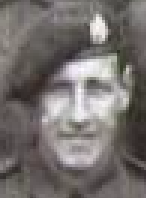Arthur Watson was with the 9th Field Company initially, had a brief period with the 3rd Para Squadron in mid-1943, then joined the 249th Field Company and remained with them until the end of the war and did indeed serve in Normandy. Here's my effort at deciphering it:
After his early service he rejoins the Army in 1937 as a Sapper, is posted to the Royal Engineers Depot 4th September 1939, then on the 8 September is sent to the 9th Field Company. I think he's serving with the BEF in France from 1 October 1939, then has 10 days leave in the UK from 5 January 1940, he doesn't seem to have gone back to France but stayed in the UK. 2nd September 1940 he's promoted to Acting Unpaid Lance-Corporal, then Acting Unpaid Corporal on 15 March 1941 and then on the same day Paid Corporal. I think it then says confirmed as war substantive rank (i.e. temporary wartime rank) of Corporal. 28 March 1941 he attends No.1 Bren Gun instructors course at the 20th Training Centre, Royal Engineers, Plymouth, and is passed as being a suitable instructor for his unit. I'm not entirely sure what the next line is about but it looks like he attended an assault course in maybe Southern Command, July 42, and received a qualification of Q2 whatever that might be. On 4 September 1942 he goes on No.29 Course for Aircraft Recognition at an RAF base that I can't make out, scoring 100 out of 150 and was classified as B. 13 May 1942 he becomes entitled to Airborne Pay. He's appointed Acting Unpaid Lance-Sergeant “wef” (with effect from) 25 August 1942, becomes paid acting Lance-Sergeant from 1st November 42 with that pay being retrospective back to 25 August. His wife dies 16 February 43.
10 April 1943, he leaves the 9th Field Company and is posted to the 3rd Parachute Squadron for administrative duties at their base in Bulford. Posted to the 249th Field Company as a Corporal 16 July 43. Then he's given a severe reprimand by the CRE (Commander Royal Engineers, chief engineer in the 6th Airborne Division) for striking a soldier on the 1 December 43. 6 June 1944 he emplanes for an undisclosed destination but this would be Normandy of course, records list his service in North-West Europe from the 6 June. He's appointed Acting Paid Lance-Sergeant with effect 29 June 1944. Embarked for the UK (from North-West Europe) on the 6 September 1944 (this fits in very well with the departure of the 6th Airborne from Normandy), then is granted 11 days leave from I think the 6 to16 September 44. After that, I can't make out the date but it looks like he relinquishes his appointment of Lance-Sergeant and reverts to War Substantive Corporal, I don't really understand this though as in the subsequent entries his rank is still recorded as Lance-Sergeant. He's then granted another period of leave from 6-15th December, on the previous line there's something written about the BLA - British Liberation Army, i.e. the British forces in Europe. I suspect these lines are the wrong way about and that the BLA line is saying that he's embarking for Europe with the rest of the Division to take part in the Ardennes campaign, this would have been at the end of the month. The next line has him returning to the UK (by air) on the 19th May 1945. So far as I can see, while much of the Division returned to the UK in February 45 to prepare for the Rhine Crossing on the 24th March, the 249th Field Company stayed behind in its entirety with the Division's sea tail - each unit contributed a detachment of men to follow in the wake of the ground forces with all of the Division's vehicles, heavy equipment and reserve kit with the idea of linking up with the airborne element of the Division when it landed somewhere. So he would not have flown into battle with the Division, but crossed the Rhine via bridges on the 24th March and drove up to link up with the Division. After that, I think it's the 1 June 1945, he's “sos” (struck off strength) of "this unit", 249th Field Company, and posted to No.6 then No.4 MDU (Military Dispersal Unit) for demobilisation. It's stamped posted to Z Class Royal Army Reserve, which basically means he's been demobbed but could be recalled as a reservist if the need arose.
Created with information kindly supplied by Lesley Roberts. Transcription of service records courtesy of Mark Hickman.
Read More



Latest Comments
There are currently no comments for this content.
Add Comment
In order to add comments you must be registered with ParaData.
If you are currently a ParaData member please login.
If you are not currently a ParaData member but wish to get involved please register.